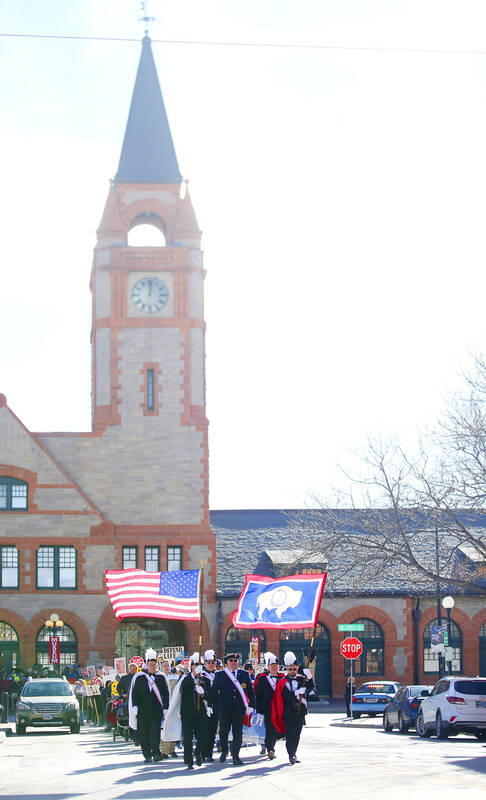Wyoming Governor Mark Gordon on Friday signed a bill prohibiting abortion pills in the state and allowed a separate measure restricting abortion to become law without his signature.
The pills are already banned in 13 states with blanket bans on all forms of abortion, and 15 states already have limited access to abortion pills.
The governor’s move came after the issue of access to abortion pills took center stage in a Texas court this week.

Photo: AP
A federal judge raised questions about a Christian group’s effort to overturn the decades-old US approval of a leading abortion drug, mifepristone.
Medication-induced abortions became the preferred method for ending pregnancy in the US even before the US Supreme Court overturned Roe v. Wade, a ruling that protected the right to abortion for nearly five decades.
A two-pill combination of mifepristone and another drug is the most common form of abortion in the country.
Wyoming’s ban on abortion pills is to take effect in July, pending any legal action that could potentially delay it.
The implementation date of the sweeping legislation banning all abortions that Gordon allowed to take effect is not specified in the bill.
In a statement, Gordon expressed concern that the latter law, dubbed the Life is a Human Right Act would result in a lawsuit that would “delay any resolution to the constitutionality of the abortion ban in Wyoming.”
He said that earlier in the day, plaintiffs in a pending lawsuit filed a challenge to the new law in the event he did not issue a veto.
“I believe this question needs to be decided as soon as possible so that the issue of abortion in Wyoming can be finally resolved, and that is best done with a vote of the people,” Gordon said.
American Civil Liberties Union Wyoming branch advocacy director Antonio Serrano criticized Gordon’s decision to sign the ban on abortion pills.
“A person’s health, not politics, should guide important medical decisions — including the decision to have an abortion,” Serrano said.

THE TRAGEDY OF PUNCH: Footage of the seven-month-old Japanese macaque has gone viral online after he was rejected by his mother and formed a bond with a soft toy A baby monkey in Japan has captured hearts around the world after videos of him being bullied by other monkeys and rejected by his mother went viral last week. Punch, a Japanese macaque, was born in July last year at Ichikawa City Zoo. He has drawn international attention after zookeepers gave him a stuffed orangutan toy after he was abandoned by his mother. Without maternal guidance to help him integrate, Punch has turned to the toy for comfort. He has been filmed multiple times being dragged and chased by older Japanese macaques inside the enclosure. Early clips showed him wandering alone with

South Korea would soon no longer be one of the few countries where Google Maps does not work properly, after its security-conscious government reversed a two-decade stance to approve the export of high-precision map data to overseas servers. The approval was made “on the condition that strict security requirements are met,” the South Korean Ministry of Land, Infrastructure and Transport said. Those conditions include blurring military and other sensitive security-related facilities, as well as restricting longitude and latitude coordinates for South Korean territory on products such as Google Maps and Google Earth, it said. The decision is expected to hurt Naver and Kakao

Australian Prime Minister Anthony Albanese yesterday said he did not take his security for granted, after he was evacuated from his residence for several hours following a bomb threat sent to a Chinese dance group. Albanese was evacuated from his Canberra residence late on Tuesday following the threat, and returned a few hours later after nothing suspicious was found. The bomb scare was among several e-mails threatening Albanese sent to a representative of Shen Yun, a classical Chinese dance troupe banned in China that is due to perform in Australia this month, a spokesperson for the group said in a statement. The e-mail

TENSIONS: The march went ahead without clashes, but arrests were still possible as police investigate suspects behind Nazi salutes, racist slurs and homophobic insults Thousands of people on Saturday marched in southeastern France under heavy security in tribute to a far-right activist whose killing, blamed on the hard left, has put the country on edge. The crowd — many wearing black and some covering their lower faces with masks — marched through the city of Lyon carrying flowers and placards bearing pictures of Quentin Deranque and the words: “justice for Quentin” and “the extreme left kills.” The 23-year-old died from head injuries following clashes between radical left and far-right supporters on the sidelines of a demonstration against a politician from the left-wing France Unbowed